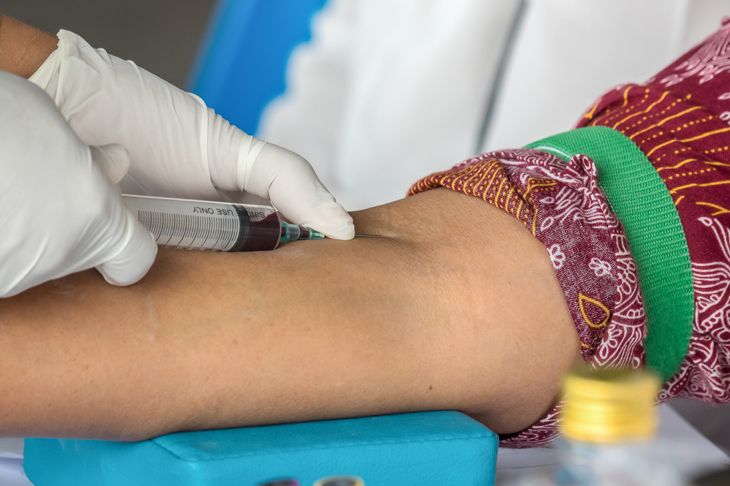People who worry about cardiovascular health should keep an eye on their cholesterol levels and blood pressure as well as the level of triglycerides in their blood. Triglycerides are a type of fat present in the blood, high concentrations of which can increase the risk of developing heart disease. Some people are genetically at greater risk of high triglycerides. However, lifestyle can help control triglycerides, even for those who are at higher risk.
What are Triglycerides?
Triglycerides are created from the breakdown of dietary fat. The body can also make triglycerides from carbohydrates, especially when the diet contains an abundance of refined carbohydrates and sugar. When we ingest food, some of the calories that the body does not currently require are converted into triglycerides and stored in the body’s fat cells. In between meals, the body releases hormones to convert triglycerides into energy. When one eats more calories than the body can burn, triglyceride levels may rise. When a doctor tests a patient’s cholesterol levels, they will often check triglyceride levels.
Characteristics of Triglycerides
Triglycerides are the most common lipids in the human body, and they contain three chains of fatty acids. They are similar in structure to phospholipids, which help build cell membranes. However, triglycerides are entirely hydrophobic, meaning they cannot dissolve in or mix with water and, as such, cannot integrate into cell membranes. To enable them to travel in the bloodstream, they must bind with special proteins called lipoproteins.
Triglycerides vs Cholesterol
Triglycerides are the unused calories stored in the body’s fat cells. Cholesterol is another kind of lipid and one of the best-known. Triglycerides are converted into energy for the body when needed. Cholesterol, on the other hand, helps build cells and some hormones. Both substances cannot dissolve in the blood and can only circulate in the bloodstream when they bind with lipoproteins.
The Importance of Triglycerides
Researchers are still unsure why high levels of triglycerides contribute to the hardening of arteries or the thickening of artery walls. More often than not, the cardiovascular system is most affected by high triglyceride levels. Metabolic syndrome and obesity are also associated with high triglycerides. Elevation in triglycerides can come from the foods we eat and other factors such as poorly controlled type 2 diabetes. Other factors include low secretion of thyroid hormones and kidney or liver disease. Some rare genetic conditions can also affect the conversion of fats into energy.
Potential Risks of High Triglycerides
One major potential complication of high triglycerides is an increased risk of coronary artery disease. Both high cholesterol and elevated triglycerides are linked to a higher risk of stroke or heart attack. Doctors may recommend people with borderline levels work to correct their triglyceride levels through lifestyle changes before they prescribe medication.
Lowering Triglycerides
Losing weight can lower triglyceride levels. The formula is the same one recommended for weight loss in general: consuming fewer calories than the body uses prevents the excess from being stored as triglycerides. Refined foods are common culprits and should be avoided when one is trying to decrease triglyceride levels. Monounsaturated fats from sources like olive oil, nuts, and avocado are generally healthier than the saturated fats in animal products and processed goods. Swapping red meat for fish such as salmon and mackerel, which are rich in omega-3, can also help reduce triglycerides.
Lifestyle Changes
Alcoholic drinks are often high in sugar and calories, and even small amounts can raise triglyceride levels. Regular aerobic exercise can also reduce triglycerides and boost HDL, the good form of cholesterol linked with a lower risk of heart disease.
Medications to Control Triglycerides
When lifestyle and dietary changes are not enough to reduce triglyceride levels, prescription medications may help. Fish oil supplements and fibrate medications may also lower triglyceride levels. In the case of fibrates, there is a risk of adverse side effects if taken with other drugs that lower cholesterol. Niacin or vitamin B3 can also lower triglycerides and LDL cholesterol. However, it takes a high dose of niacin to reduce triglycerides, and there is the risk of serious side effects. The use of niacin to lower triglycerides has fallen out of favor recently due to the potential risks. Only use niacin under the care of a doctor.
Checking Triglyceride Levels
A blood test can provide an accurate reading of triglyceride levels and many other important factors. Doctors recommend that patients fast for nine to 12 hours before the test to ensure they get the most accurate results. Doctors measure triglycerides in milligrams per deciliter of blood. A normal triglyceride level is less than 150 mg per deciliter of blood, borderline is up to 199 mg per deciliter, and high triglyceride levels are above 200 mg per deciliter.
The Impact of Triglycerides on Health
The human body needs a certain amount of dietary fat and carbohydrates to serve as an energy source. But consuming excess calories, especially in the form of refined carbohydrates and sugar, can cause an unhealthy rise in triglycerides, as the excess carbohydrates are stored as triglycerides inside fat cells. Excess triglycerides in the blood can lead to hypertriglyceridemia, a finding commonly associated with coronary heart disease.

 Home
Home Health
Health Diet & Nutrition
Diet & Nutrition Living Well
Living Well More
More




















